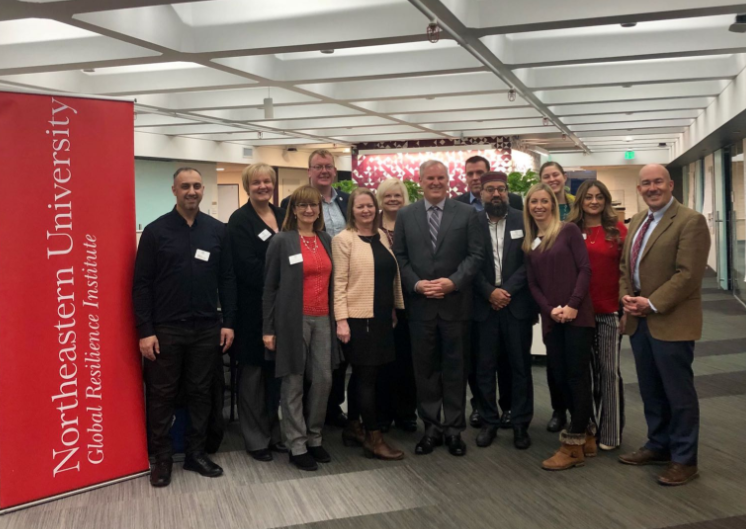
Manchester & Boston Radical Exchange: Shared approaches to tackling radicalisation & extremism

You may be wondering why Odd Arts, a theatre & arts organisation is writing about a U.S. Embassy exchange between Manchester & Boston on ‘countering violent extremism’ – unless you are already aware of the type of work we do. For those of you who don’t know, in short, we use theatre and the arts to challenge attitudes & behaviours, increase opportunities, reduce people’s risk and increase community cohesion – and have done for 15 years now. More recently and relevantly, we have delivered work specifically around ‘radicalisation’, to 1000’s of young people and also to 100’s of professionals in partnership with Manchester City Council and Manchester High Schools.
Radicalisation is a complex, vast and contentious issue. Society has generally been sceptical of the Home Office PREVENT strategy, and often people avoid the subject matter out of fear of offending or worsening a situation, and sometimes because they simply don’t know what it means … and this is understandable! In a nutshell, the approach we take to tackling radicalisation is:
- Allowing people to explore the meaning – understanding that being radical can be a good thing, and understanding when radical views might become dangerous, and in extreme cases, potentially terrorism
- Encouraging difficult conversations, where people voice their fears, prejudices and perceptions of the world especially around issues such as politics, religion, immigration and race
- Promoting critical thinking so that people can understand where their own and other’s viewpoints come from
- Challenging & exploring hateful or divisive attitudes without blame
- Supporting people to become active citizens that promote inclusion and social cohesion
- Highlighting the vulnerability or risk factors that make individuals more susceptible to being groomed or radicalised
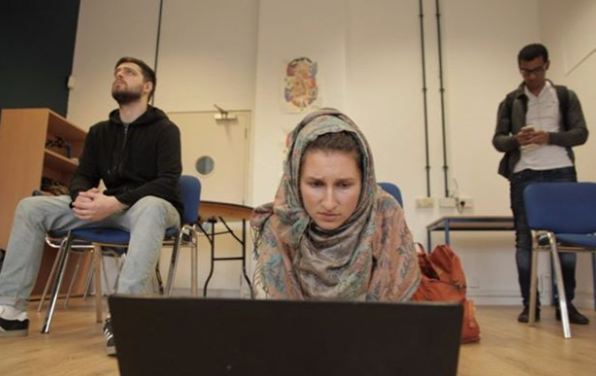
The work we deliver to do this includes a theatre piece and interactive workshop that involves three characters: One young man with far right involvement; another DAESH inspired young man; and a female Muslim also struggling to ‘fit in’ due to the society she lives in and wider Islamophobia. The ‘forum theatre’ piece (inspired by Augusto Boal’s work) later invites the audience member to intervene and try out solutions they feel will help to support the young people in the performance and prevent them leading dangerous or harmful paths. The audience practice conflict resolution, negotiating skills and empathy – transferable skills we hope will support them in ‘real life situations’. The response has been fascinating – perhaps another blog once the full evaluation of around 3500 participants has been completed!
This project, alongside other work we deliver around identity and belonging, is how we received our invite to participate in the U.S Embassy’s exchange between Manchester and Boston to Counter Violent Extremism. We went alongside representatives from Greater Manchester Police, Manchester City Council, Levenshulme High School, Manchester Central Mosque, and Community on Solid Ground.
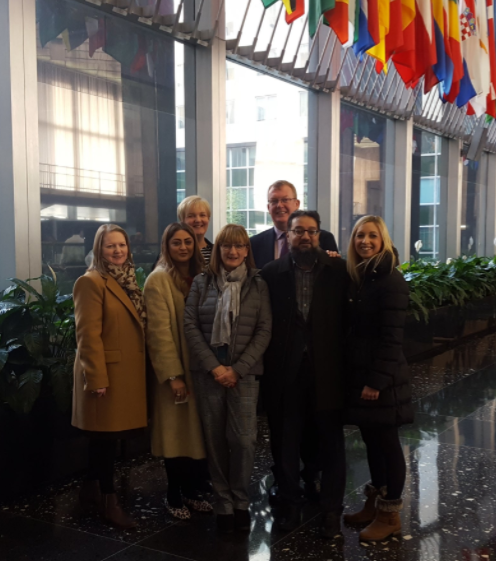
Below I have written diary like notes of my learning journey in Washington, then Boston, and finally tried to summarise the main things I have taken away from this exchange.
Dec 4th, Melrose Hotel: Federalism Briefing
Fascinating overview and context of U.S. Government. Emphasis on States encouraging ‘individual initiative’ and ‘bottom up’ approach. Strategies have to be formed by civil societies themselves – never from Government.
“No law can be made against freedom of speech” meaning hate laws cannot be made. Government is forbidden to say what religion is and always separates Government from Religion (in order to protect interference) … I think this explains a lot about Trump’s ability to share certain ‘religious hate’ views that some here in the UK feel would be illegal.
85% work in the private sector and therefor strategies always have to involve business.
Federal states is the equivalent to 50 flags – 50 different sets of laws. No National Curriculum, no NHS, and 1000’s of Law Enforcement Agencies.
Key learning / questions:
- U.S. approach to radicalisation cannot be directly compared to UK due to such hugely differing Governance
- Could we extract more of the ‘bottom up’ approach into our work?
- Could UK ever have such integrated involvement with community, society and the business and private sector?
Dec 4th, U.S. Dept of State’s Office of Countering Violent Extremism
Reflection on programme aims, content and context
Dec 4th, George Washington University, Program on Extremism
Researcher suggests there is no real concerted effort to deal with the issue of CVE in U.S. and that central Government is not pushing it and the FBI is not prioritising prevention. No mention of ‘Neo-Nazi’ or White extremism. Surprised to hear how little researchers think is being done in ‘soft terrorist prevention’.

Dec 5th, World Organisation for Resource Development and Education
A good example of ‘prevention’ work that reflects many of our UK approaches, including work around ‘vulnerabilities’ and ‘inclusion’, ‘community engagement’ and a ‘whole community approach’. It aims to: Connect – Engage – Intervene – Educate
Clearly work IS being done, but it isn’t part of a wider Government strategy.
Dec 5th, Dept of Homeland Security
Interesting to hear how the DHS has recognised that embedding RESPECT and RELIGIOUS ACTIVITY UNDERSTANDING is critical to ensuring people’s civil right’s should not be impinged. They have introduced ‘Cultural Competency Training’ to security staff. Interesting to hear that 96% of Washington people VOTED AGAINST the current U.S. president.
Key learning / questions:
- The overriding values of ‘respect, inclusion, acceptance and diversity’ came across – the absolute opposite to that of their current President (I personally believe). Interesting to see how people have managed to maintain these values under the current President Trump – perhaps a sign of Federalism in action – never giving too much power to the Government.
- the 50 State laws and local governments means that a wider knowledge of one another’s work seems impossible. While Washington University says prevention work is not happening widely or strategically, clearly many pockets or individual States and people are taking a lead on this.
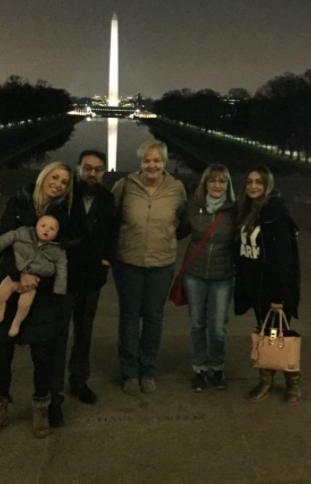
A picture here with me, my youngest child (who the Embassy kindly let go on the trip as still nursed by me, along with some of the other delegates).
Dec 5th, Center for Islam and Religious Freedom
We met with a previously convicted terrorist who had been released Dec 2016 following a 13 year stint in prison. Fascinating to see how he as a ‘reformed’ individual understood and analysed his ‘former’ self. It gave a real insight into the mindset of a convicted terrorist. Also really interesting to see how he see’s himself as more of a “80’s, 90’s freedom fighter” and separates himself entirely from the DAESH inspired terrorists who “wage war against all humanity”.
Dec 6th, Travel from Washington to Boston
This was not an enjoyable or restful flight with my baby!
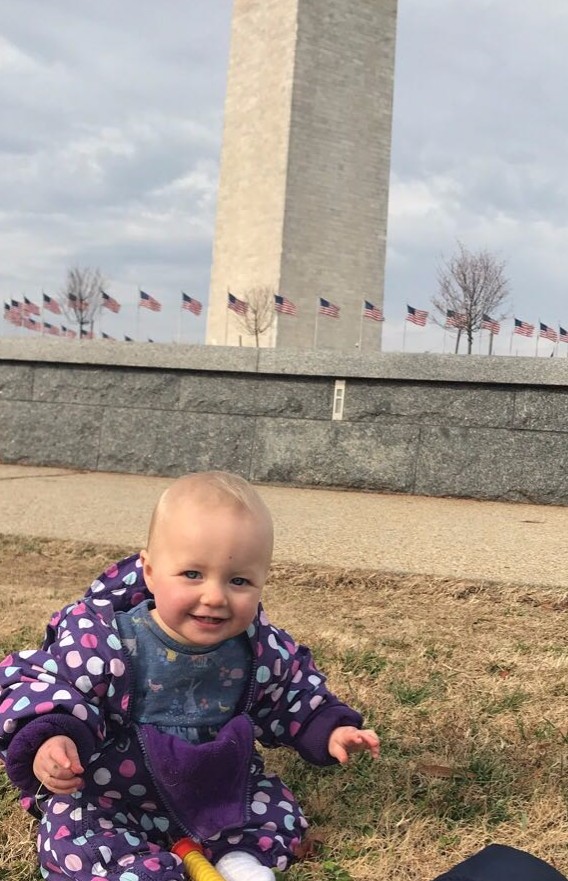
Dec 7th, Boston Police Dept
Totally inspired by their work. Really progressive dept. Fantastic multi-agency ‘out-of-the-box’ approach to tackle gun crime. The Boston wider Policing picture is quite unbelievable (when compared the Manchester). The City has 260-280 shootings per year (mostly within a 2 mile radius). They were at an all time LOW last year of 40 homicides through shootings! The City is comparable size to Manchester, but the gun laws mean the picture is hugely different. We came in to the meeting following a night where 3 young people were shot, 1 fatal. Within the City they estimate 120 different gangs or groups.
Partnership work with social workers, youth leaders, sports and education organisations is critical. Massive effort to deal with post traumatic distress. They recognise that the CHRONIC EXPOSURE TO MULTIPLE FORMS OF VIOLENCE needs addressing. They try to LIFT UP NOT LOCK UP. Businesses very supportive in funding (with tax break) many of the services that support young people in gang related areas / situations.
Key learning / questions:
- We NEED to deal support young people in South Manchester who have witnessed violent / traumatic incidents, and not only with those immediately impacted. Whole communities can suffer from PTSD when a murder / violent episode happens to the people they know and community they belong to. I think Boston is way ahead of us in multi-agency working and effective response to trauma.
- Boston clearly understands effective and progressive way to deal with ‘gang related’ and ‘violent young people’ but not specifically with potentially radicalised young people. This is probably because the gun laws and homicides make it a matter they cannot ignore. The subject of ‘radicalisation’ seems somewhat ignored.
Dec 7th, Emergency Services and Resilience
Like Manchester, the people of Boston were resilient and the city was proud of the emergency service response to the Boston bomb.
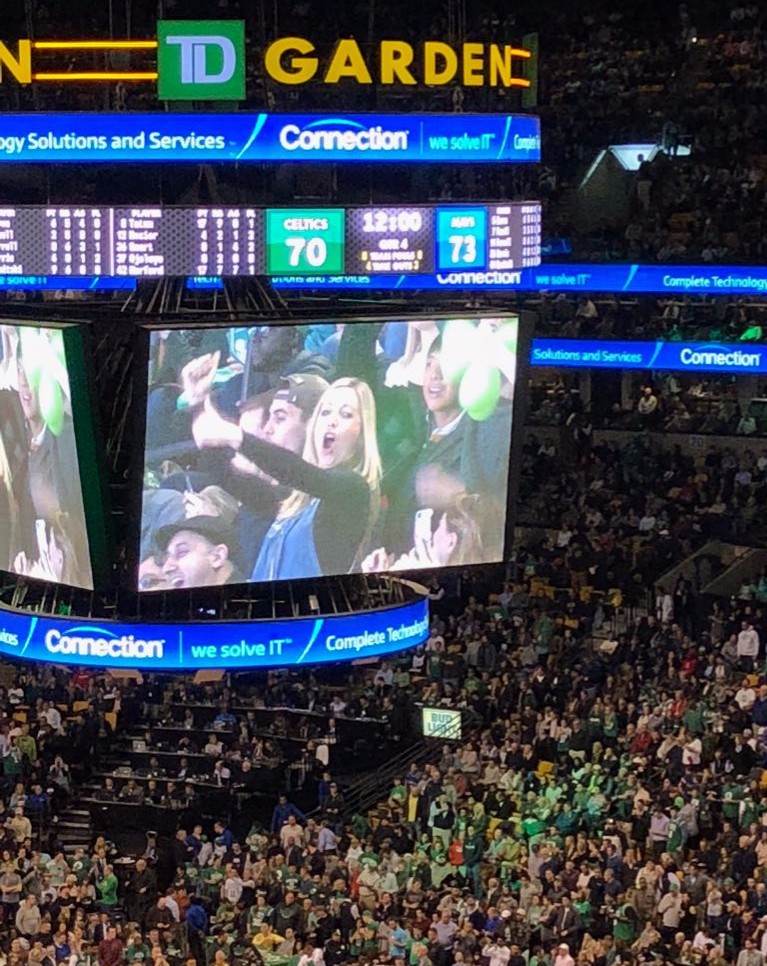
I shouldn’t have, but I did … This is me above determined (and successful) in getting on the big screen an a basketball match we went to one evening!
Dec 7th, One World Strong Foundation
Survivors of Boston bomb come together to support victims of other terrorist acts. Clearly this is hugely beneficial to the ‘survivors’ who are part of the group, and many people they visit. My concerns are that not all survivors of a terrorist attack would want this initiative. For those who state individual choice to receive this support it could be fantastic. I would be interested to hear more about how they know people want this intervention and how they safeguard the people they visit as they want to see them at times of extreme vulnerability and may not be trained to deal with this.
Dec 8th, Rebuilding Every Community Around Peace (RECAP)
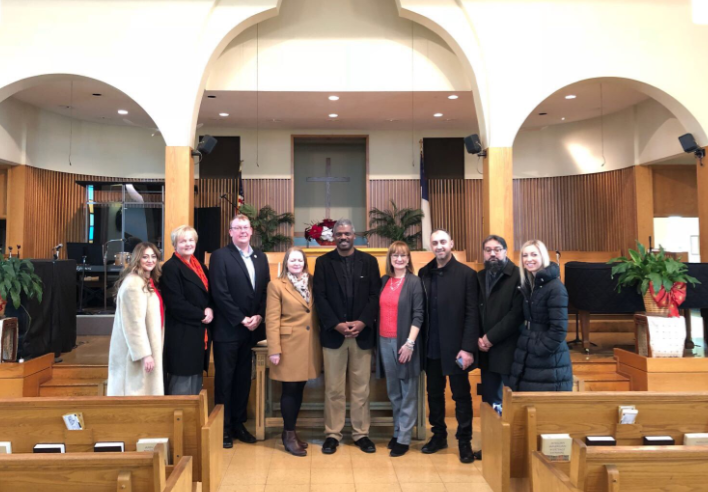
Meeting with the inspiring Baptist Minister Rev Jeffrey Brown, known to be responsible for the ‘Boston Miracle’ which saw a 79% reduction in homicide through gang shooting over 8 years. He spoke of the strong and authentic partnership with Boston Police and how this was built over many years. Spoke of the difficulty but importance in not working solo and bringing together all agencies. Over the years he has set up midnight basketball sessions, peace walks every week, being on the scene following every murder, having young people call him at any time. He spoke of listening and not preaching to the young people and not expecting them to attend his Church as part of this relationship. The Church stopped looking at youth as a problem to be solved.
As violence goes down it UNLOCKS ECONOMIC POTENTIAL. Rev Jeffrey is trying to engage more business and real estate in the area.
What an amazing man. His Church was one that Martin Luther King was heavily involved with and preached at! Fantastic to see the pictures of Martin Luther around the Church.
Key learning / questions:
- Do more! Give your all! Never become complacent.
- Could we deliver workshops through the night? Midnight sessions? Create safe havens? This is when young people are out on the street with often least safety but most danger. How would we safeguard this?
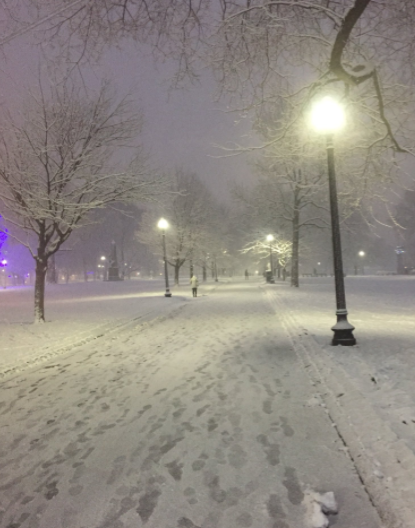 Boston snow.
Boston snow.
>Dec 8th, InnerCity Weightlifting (ICW)
A fantastic youth organisation based at a secret location. It engages people still involved in or associated with gangs through weightlifting, and provides wrap around support and signposting as well as training them up to become professional, paid, personal trainers. A different centre is created for each gang (or those that can be associated with one another), so that rivals will not end up in the same centre. They have someone (an ex gang member out of prison) committed to understanding who is and is not safe to be allowed in and security is high. Their professional clients become friends with the trainers and they become involved in parts of society they have never really engaged with before. It is very much about trying to break down the hierarchy in society. Many private organisations fund the work (costing over $1M per year)
It’s main theory follows:
TRUST – HOPE – SOCIAL CAPITAL – ECONOMIC MOBILITY and acts as a social leverage to other opportunities. To complete the whole journey it would usually take 6 and a half years.
Key learning / questions:
- Would the UK accept a centre whose rehabilitation programme takes 6.5 years and fund an initiative that took this long? It should do as this is realistic!
- The safeguarding seems less ‘conformed’ than in UK – Would / should we ever encourage gym clients in the personal lives and problems of the people who are training them (that are associated with very dangerous gangs)?
- I know about many sports organisations working with ex-offenders or prisoners, but I love the building of these participants into professionals and bringing in private clients – does anywhere do this in UK?
- Could a rehabilitation community organisation ever be fully privately funded in the UK? Or does our whole system make this unrealistic.
8th Dec, Islamic Society of Boston Cultural Centre
Busy, vibrant community engaged Mosque that delivers many community programme including how Islam sits within modern society. This sort of conversation is imperative for reducing the risk of people disengaging from their Mosque to become radicalised.
8th Dec, Northeastern University, Global Resilience Institute
In U.S. if they have a National disaster there is no formal process (each State will have their own).
This dept researchers the wide International approach to Global Resilience – including the holistic approach to managing these events including how we successfully manage the aftermath, resources and internal reaction to the events.
11th Dec, Police Commissioner for Boston Police Dept
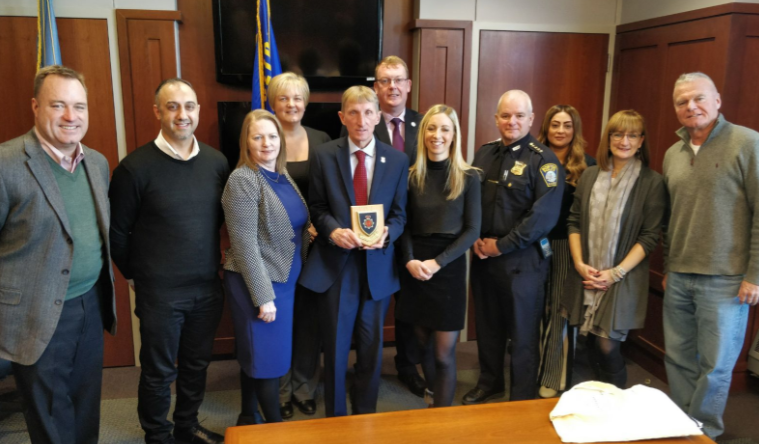
Hugely inspiring, approachable and informal man who reflects and clearly steers the wider approach of his whole force.
They want to make it clear they will protect immigration, trying to build more trust in communities. If the Police have to enforce or act on someone in the Muslim community, meetings are held to ensure the community understand why and to make sure it doesn’t damage relations.
Boston has over 25% of residents born in a different country.
The force has an ice-cream / hot chocolate van to hand out free refreshments to communities in crisis in order to hold conversations and build relations. The force gives our Christmas presents and Police have shopping trips with the people from the most deprived communities. The staff play basketball and football with the same people they may have arrested the night before. Real ‘on the ground’ relationships.
Key learning / questions:
- How do we build this level of communication and trust within our communities and GMP?
- How could we pull in the same sorts of funding to Policing in UK when Boston receives huge amounts from private businesses?
- Will the values of this force remain when this commissioner leaves? They seem to be embedded within all levels / teams within Boston Police and not just one dept.
11th Dec, Medical Intelligence Centre
“Envisions a resilient Boston through healthy, informed and connected communities”.
It trains people in communication skills to deal with public health disasters or issues and equipping young people with ‘what to do’ in these emergencies. They have Neighbourhood Trauma Teams and also train people to deal with PTSD. Young people can request psychological 1st aid – it is voluntary. It includes 8 core actions for dealing with PTSD as well as stabilising and resilience techniques.
Key learning / questions:
- We must do more to deal with PTSD within communities
- Can we train young people, communities, youth workers in ‘psychological first aid’ or the equivalent of this?
- Can I find PTSD / psychological first aid training for Odd Arts staff – we must do more in this area!
11th Dec, Urbano
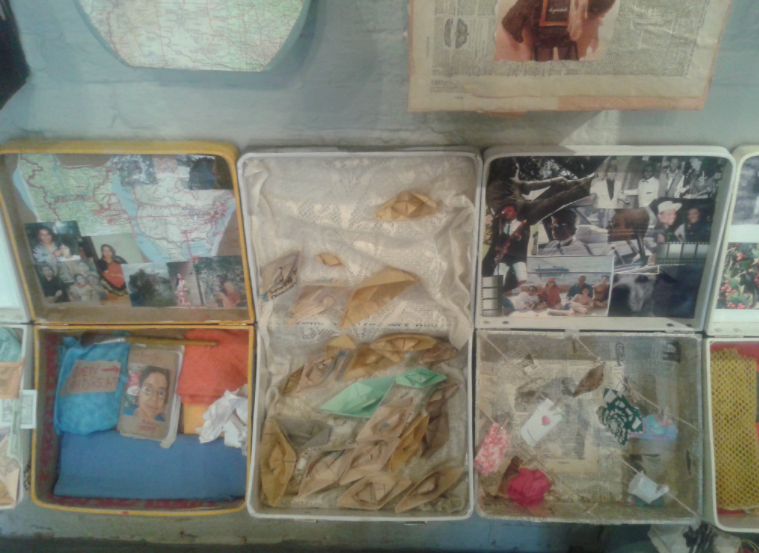
An arts exhibition and engagement centre working with professional artists and communities for ‘transformation, community cohesion and social change’. Lovely use of art to explore identity, immigration and belonging (very related to our conversation around radicalisation and the vulnerabilities that lead to it), using suitcases as the canvas. Also an exhibition of melted down amnesty guns to create spades that were used to rebuild / replant areas of the city.
11th Dec, Boston Children’s Hospital, Refugee Trauma and Resilience Centre
Another example of what I would call a radicalisation ‘prevention’ programme working with minority communities, vulnerable people and holding difficult conversations – run by a clinical psychologist and clinical social worker. They highlighted that discrimination is as much of an indicator as trauma to mental ill health. Their approach reflects the approach we take in Manchester and the ‘Radeqaul’ programme and Prevent strategy. This seemed the most similar to the way we work – but a one off / small example (working with only 12 people on their current programme).
11th Dec, Cocktail Reception hosted by British Consulate-General of Boston
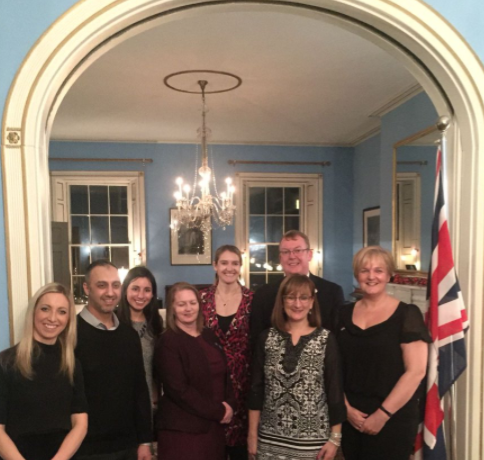
12th Dec, Commonwealth Fusion Center
A Nationwide Suspicious Activity Initiative (where equivalent UK channel referrals would go – but U.S. has no equivalent – they were very interested in how our PREVENT strategy worked).
12th Dec, Massachusetts Emergency Management Agency
Based in a bunker designed to withhold a Nuclear War! Includes full ‘preparedness’ policies. Shows how many more ‘natural disaster’ emergencies U.S. deals with compared to U.K but less on public perception / viewpoints.
My Summary
So, reflecting on all these experiences, what have I learnt? I do believe Manchester (and in some ways the whole of the UK) does have great partnerships, communication and a shared vision around tackling hate crime, radicalisation and extremism – in a way that would always be more complicated for the U.S. and Boston due the the size of the Country and set of of their Government. Gun crime and gang violence is such a real issue in Boston and U.S. that radicalisation seems to be ‘less urgent’ an issue for them to explore, especially when “those at the top aren’t interested”. Manchester has a lot to share with Boston around a wider city approach to trying to increase community cohesion and engage communities with the ‘difficult conversations’ needed. We have a lot to learn and take from the innovative and in many ways daring approach that Boston takes to engaging young people involved in gangs and reducing wider harm. I don’t have many ‘answers’ following the trip, however I do have many things I will definitely explore with the view to change the way we work for the better in the future, which include:
- How can we incorporate more ‘Psychological 1st aid’ training into our sessions
- How can Odd Arts and the community help young people in areas where youth violence is high, deal with PTSD.
- Would it ever be safe, feasible or useful to deliver workshops through the night (midnight – 4am) when young people are potentially at their most vulnerable?
- How can we have a more ‘bottom up’ approach to our work and involve the community and individuals from the start and at every stage?
- Partnership, shared learning / vision, and multi-agency working is key to tackling radicalisation. We must all “leave our ego’s at the door” and work together to make Manchester a safer and more cohesive City.
With huge thanks to the U.S Embassy, Cultural Visitas and World Boston for organising such a fruitful trip. We look forward to hosting the Boston delegation in January.

